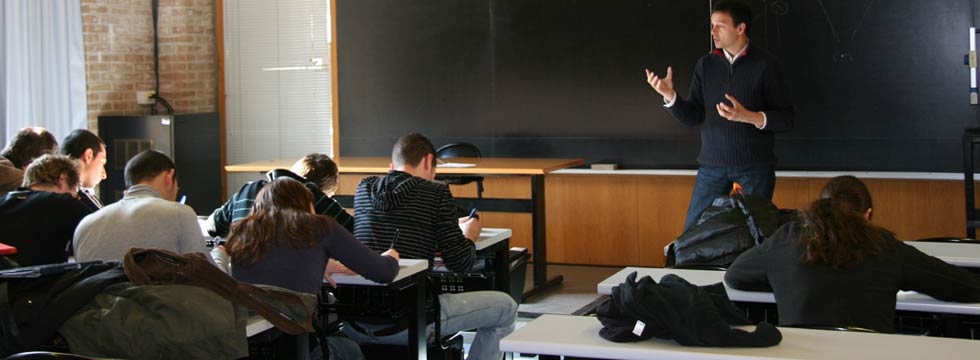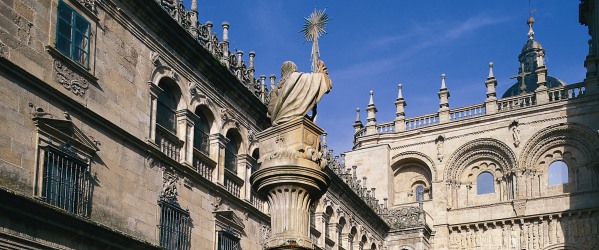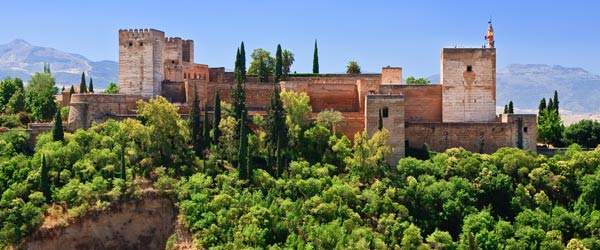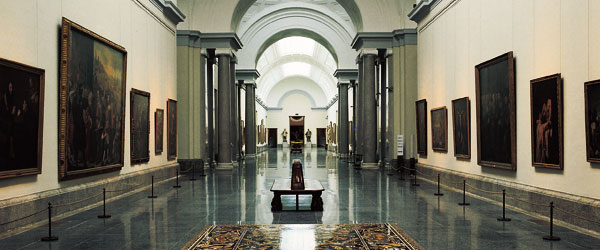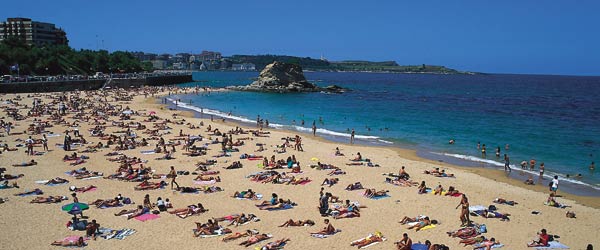About Spain
During your time in Spain you should make a special point of visiting the Alhambra in Granada, the Segovia aqueduct, the Great Mosque of Cordoba, Burgos Cathedral, the royal monastery of San Lorenzo de El Escorial, the Sagrada Familia church in Barcelona… The list is endless and features a large number of fascinating places. You're guaranteed never to get bored.
Culture
That's because one of the aspects you're sure to enjoy most during your stay in Spain is its rich historic and cultural heritage. Throughout the centuries the Spanish territory has seen a procession of people and cultures, including Celts, Iberians, Phoenicians, Greeks, Carthaginians, Romans, Germanic races, Muslims… right up to the reign of the Catholic Monarchs and the discovery of America in 1492. The remnants of these cultures have endowed Spain today with a vast quantity of monuments which are admired all over the world. It's no coincidence that Spain is the country with the third greatest number of UNESCO-designated World Heritage sites. What's more, Spain is the birthplace of numerous famous artists throughout history, such as Velazquez, Goya, Picasso, Miró, Dalí... in addition to other more modern creators like Moneo, Calatrava, Chillida, Tàpies, Barceló... Most of them are sure to sound very familiar.
Another major attraction is our museums. Spain is home to some of the most important museums on the planet, as is the case of the Prado Museum in Madrid. We recommend that before making a visit, you check the rates for students, as most museums and monuments offer special discount ticketss.
Spain is also a byword in the world of film and theatre, staging numerous famous events such as the theatre festivals of Mérida, Sagunto and Almagro, and film festivals like the ones in San Sebastián and Valladolid. Highly recommended. In the case of film in particular, you're bound to be familiar with household names like the director Pedro Almodóvar and the actors Jarvier Bardem, Penélope Cruz and Antonio Banderas. And it's hardly surprising, since Spain is one of the countries that has earned most Oscar nominations from the Academy of Motion Picture Arts and Sciences in recent years. When you go to the cinema in Spain, if you still have difficulty understanding the language, remember that there are specialised cinemas which screen films in the original version. And to save a few Euros you can always opt to go on the "día del espectador" or "spectator's day", when special discounted rates are available.
In literature, opera, music, dance... you'll find more and more Spaniards making waves internationally. In fact one of our best-known artistic expressions, flamenco, has been declared an element of Intangible World Heritage by the UNESCO.
While you're in Spain, we recommend you not only seize the chance to experience some of these major cultural events, but also make time (particularly in large cities) to visit alternative theatre and concert venues (where you'll be able to see singer-songwriters, rock, jazz…), independent art galleries, free film screenings... These are particularly popular with young people and you'll love the atmosphere. Another increasingly popular option? Buying tickets for a musical in such landmark sites as Madrid's Gran Vía thoroughfare.
And of course in the sphere of music we can't neglect to mention the major music festivals that bring together thousands of young people, like FIB Heineken (Benicàssim International Festival), Sónar (International Festival of Progressive Music and Multimedia Arts in Barcelona), Festimad Sur (in Madrid), Bilbao BBK Live (in Bilbao) and Viña Rock (in Albacete).
Libraries and universities
Spain has a very extensive network of public libraries. Admission is usually free, so you'll find it very useful when you want to consult material in relation to your studies. The most important library in Spain is the National Library (in Madrid), with a collection consisting of around 25 million items. If you need to visit this library at any time we recommend that you check the conditions of access beforehand, since you sometimes need special authorisation to handle particular documents.
Spain's universities also play a key role in disseminating our national culture, and many of the summer courses that are on offer have become very well known.
Festivities and traditions
Spain has a whole range of activities that have been declared to be of International Tourist Interest. Why is that? Because these are unique events steeped in tradition, culture, and of course, guaranteeing abundant fun and high spirits. Everything from the carnival festivities in Cadiz and Santa Cruz de Tenerife (in February), to the Fallas bonfire festival in Valencia (in March), Easter week (in March-April), the April Fair in Seville, the bonfire of San Juan in Alicante (in June), the bull-running festivities of San Fermín in Pamplona (July) and the Tomatina tomato fight in Buñol (in August)... All of them offer the chance to have fun and experience some memorable moments.
When you've already made a group of friends, why not arrange a getaway to some of these events?
Nature and sport
In Spain you'll find a large number of Biosphere Reserves and 14 National Parks, all of which make the ideal place to recharge your batteries by walking in the heart of nature, or enjoying outdoor activities... Options include exploring the National Parks of Doñana and Monfragüe in an off-road vehicle, scuba diving in the Islas Atlánticas National Park, climbing the Teide (the highest peak in Spain)... There are cinematic landscapes like Las Médulas and Riotinto, and perfectly signposted trails such as the Vías Verdes or "Green Routes" (disused railway tracks), in addition to internationally famous routes like the Way of Saint James.
And on the subject of the sea, in Spain you'll find almost 8,000 kilometres of coastline awaiting you, with beaches which range from the endless stretches of sand in Andalusia and the Mediterranean, to the coves of the Balearic Islands and the Canaries, and the unspoilt natural beaches in the north.
In addition to enjoying these outdoor activities in natural settings at your own pace, remember that all the campuses offer a range of sports facilities and teams that you can sign up for. In fact Spain is a sports-loving country, and you're already bound to be familiar with the stars of the football league and internationally famous sporting heroes such as Rafa Nadal, Fernando Alonso and Pau Gasol.
Gastronomy
Spanish gastronomy is so varied, delicious and healthy that eating in Spain is always a pleasure. Some of the best-known products and dishes from the country's popular cuisine are the pure Iberian acorn-fed ham (unique in the world), olive oil, potato omelette, paella (several different varieties), gazpacho (perfect for summer), cocido (chickpea stew) and fabada (white bean stew). But Spanish gastronomy is also synonymous with wonderful cheeses, fish, seafood, vegetables, fruit and a variety of fine sweets.
You'll love the custom of going from bar to bar and being served tapas (small portions of food) when you ask for your drink. And when you're deciding what to order, why not try some of the excellent Spanish wines like Rioja or Ribera del Duero?
Remember that the Mediterranean diet so typical of Spain has been declared an element of Cultural and Intangible World Heritage by the UNESCO. What's more, now not only can you enjoy it every day, you can also sign up for workshops, guided gastronomic routes, tasting courses…
Nightlife
Nightlife in Spain can be extremely diverse, depending on what you're looking for. If you like peace and quiet, we recommend going from one bar to another and dining on tapas (small portions of food which are often served free when you order a drink), going to concerts, or relaxing at any of the numerous outdoor restaurants and cafés in fine weather...
Remember that in Spain people tend to go out late, often after 10 pm in the evening. Then, if you want to carry on having fun, in many places you'll find numerous bars and discos that stay open until dawn. The most popular days for going out are Fridays and Saturdays, although among students, it's becoming more and more common to go out on Thursdays too.
The most famous destinations for nightlife are cities like Madrid, Barcelona, Valencia, Bilbao, Salamanca and Granada, and places such as the island of Ibiza and the Costa del Sol. Cities usually have several different neighbourhoods that are known for their nightlife, depending on your tastes. Here are a few links where you can find the best places for going out at night in some of the main cities:
Madrid.
Barcelona.
Valencia.
Bilbao.
Sevilla.
Granada.
Zaragoza.
Salamanca.
Santiago de Compostela.
You'll find more information on Spain in our section Spain and its regions.
We also recommend visiting the official Tourism and Culture websites in Spain:
Spain.info
Spainisculture.com

